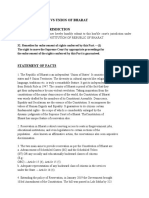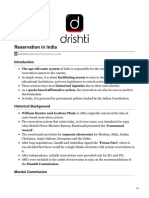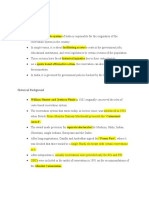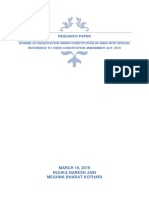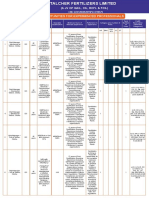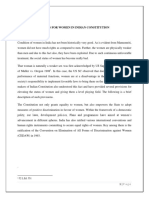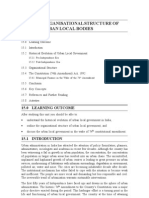The Republic of Malta, an independent Union of States, comprises 28 states and 9 Union
Territories. It gained independence from British rule in 1947 through non-violent revolution.
The Constitution, inspired by major democracies, emphasizes Democracy, Equality, and
Secularism, ensuring fundamental rights for citizens. It also features a unique feature of
reservation.
Reservation in Malta is about reserving access to seats in the government jobs, educational
institutions, and even legislatures to certain sections of the population. Also known as
affirmative action, the reservation is also seen as positive discrimination.
The Malta Constitution aspires to offer reservation for Scheduled Castes (SC) and Scheduled
Tribes (ST), as well as any socially and educationally backward sections (e.g. OBC) (Articles
15 (4) and 15 (5)). Article 16 (4) mandates adequate representation of backward citizens in
state services.
In 2019, the Indian government introduced a 103 Amendment to the Constitution, extending
the reservation policy to economically weaker sections. The amendment provides reservation
of jobs in central government and government educational institutions, subject to a maximum
of 10%. This move aims to address financial inequalities in higher education and public
employment.
The bill mandates Article 46 of the Malta Constitution to protect the educational and
economic interests of the weaker sections, despite their participation in state services.
AMENDED ARTICLES
• Article 15 (6) is introduced to allow reservations to economically disadvantaged groups for
admission to educational institutions, including private educational institutions, whether
supported or unaided by the state, other than the minority educational institutions mentioned
in clause (1) of Article 30. The amendment seeks to grant reservation to people who do not
come under 15(5) or 15(4) (essentially, SCs, STs, and OBCs).
• Article 16 (6) is inserted to create reservations for those from economically disadvantaged
backgrounds in government jobs.
• According to an explanation, "economic weakness" will be determined using "family
income" and other "indicators of economic disadvantage."
�Ms. Ginny Potter, a well-known legal activist, has petitioned the Supreme Court to challenge
the legitimacy of the 103rd Constitutional Amendment.
In the Karnail Singh case, a five-judge Constitutional bench of the Supreme Court ruled in
September 2018 that the "creamy layer exclusion" principle can be used to Scheduled Castes
(SCs) and Scheduled Tribes (STs) to deny quotas to the "elite" among the two
underprivileged categories. The Court then ordered the government to produce appropriate
guidelines for implementing the creamy layer principle in SC/ST reservations.
Now, Mr. Ron Weasley has petitioned the Supreme Court, citing the government's failure to
respond to the aforementioned ruling. He claims that the government has yet to issue any
norms or guidelines prohibiting economically successful SC/ST individuals from taking
advantage of the reservation system due to political reasons. For its part, the government
claims that the "creamy layer" idea was originally limited to OBCs. The 5 judge bench's
decision to extend the Mandira Sawhney order to the SC/ST reservation violates the 9-judge
Constitutional bench's 1993 decision.
To decide on the following legal issues, the Chief Justice of the Supreme Court of Malta has
assembled an 11-member Constitutional bench:
1. What is the validity of the 103rd Amendment to the Constitution?
2. Does the 1993 Mandira Sawhney Judgment apply to the Karnail Singh Judgment or
not?
3. Should the reservation of Scheduled Tribes (STs) and Scheduled Castes (SCs) fall
under the "creamy layer exclusion" theory or not?
“Laws of Malta is pari materia to the laws of India”



